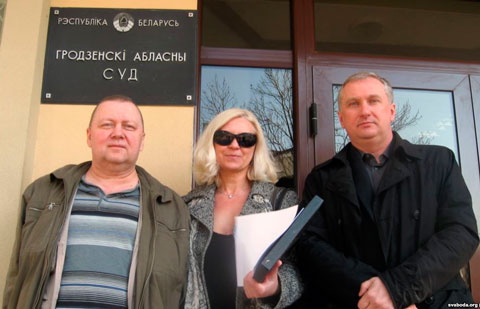Court of cassation confirms ban on Ales Bialiatski’s book

Human rights defenders Viktar Sazonau, Tatsiana Reviaka and Pavel Sapelka outside the Hrodna Regional Court building. 31 March 2014.
On March 31, the Hrodna Regional Court upheld the decision to ban Ales Bialiatski’s book “Asvechanyia Belarushchynai” (“Enlightened by Belarusian Issue”), having considered a cassation appeal by human rights defender Tatsiana Reviaka.
According to Tatsiana Reviaka, who appealed against the verdict of the Ashmiany District Court, it took just three minutes for a panel of judges for civil cases to make its decision, which indicates that it was made in advance. Moreover, the judge behaved aggressively and savagely. He did not allow the applicants to speak in full and convey their views to the court.
“I first encountered such rudeness in court. Judge Aliaksandr Kalesnik interrupted me, asked questions and did not allow to speak in response, behaved very emotionally and even inadequately in some moments. This behavior is evidence of both the judge’s low legal level, but also of the level of prejudice against the case,” says Tatsiana Reviaka. “The court did not hear arguments because it did not see the point. The judge did not want to evaluate the appeal in terms of how the book could harm political and economic interests, national security, public health and morals – he just reduced it to the question of whether the copies I had were for personal or non-personal use. Although the main part of the decision to re-export the book was that the book was “harmful”, regardless of the purpose for which it was imported to Belarus."
Lawyer Pavel Sapelka, who represented Tatsiana Reviaka’s interests in court, said that both applicants were deprived of their rights.
“And we might try to influence the court with our voice, but we are not protected by the law in this part. In this case, we could be held responsible for contempt of court. However, the court for some reason did not show respect to us, did not listen to our legally sound arguments. Meanwhile, liability of the court for contempt of applicants is not provided by law,” says Pavel Sapelka. “And, perhaps, due to the fact that the court did not hear everything, it had such a superficial conclusion. Although the people who were present in the courtroom somehow understood what we wanted to convey to the court.”
Today, the appeal was considered first among other complaints, so the courtroom was full of people awaiting for the consideration of their civil cases.
“We received a lot of moral support from the audience,” adds Tatsiana Reviaka. “The people listened with interest, and it was evident that they were pleased that the applicants rebuffed the rudeness of the court. Besides, the people who are familiar with Judge Kalesnik said that he usually did not behave like that.”
The reasons for which the cassation appeal was dismissed will be available in the court’s ruling expected to appear within five days.
40 copies of Ales Bialiatski’s book “Asvechanyia Belarushchynai” were taken from human rights defender Tatsiana Reviaka at the Belarusian-Lithuanian border checkpoint “Kamenny Loh” on July 3, 2013. The collection of literary essays, which were published during the author’s imprisonment, was sent for examination, which was carried out by an illegally created panel of experts. According to the results of the two examinations, the customs officials banned the edition for import to Belarus. Tatsiana Reviaka appealed against the decision in court.

















